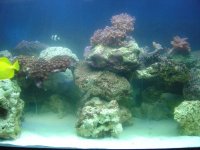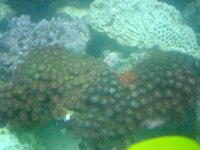I'm building a zoanthid tank and have been studying them non stop lately. Here's some of what I've managed to confirm from various sources:
Different zoanthids require different amounts of light and grow at different rates due to photosynthetic production rates. In addition to normal water parameters being in check, zoas require iodine and strontium in order to grow and reproduce, in a smaller tank, regular water changes with quality salt should maintain the level of these trace elements, however infrequent water changes or larger tanks may require the addition of these elements to maintain acceptable levels for zoanthid growth.
Here are a few things you can try:
1. Check your bulbs and replace if necessary
2. Move your zoas to provide more light (contrary to popular belief, zoas are not all low light corals even though they're hardy enough to survive low light conditions)
3. Test your iodine and strontium levels and make sure they're acceptable. Iodine is found at 0.06ppm in seawater and can be slightly higher to promote zoanthid growth, strontium is fount at 8ppm
Let me know if this helps
If none of this works... give your zoas to me and try a different type of coral... lol







